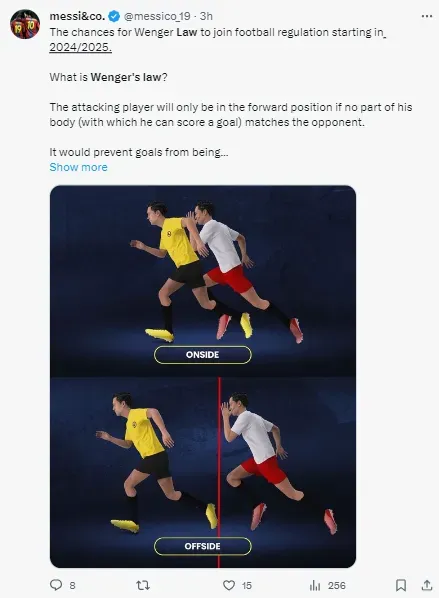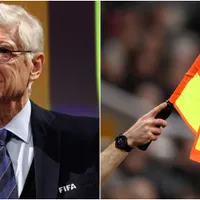International Football Association Board (IFAB), the independent law-making authority for world soccer, is reportedly debating whether to significantly alter the offside rule.
The newly proposed rule is said to align closely with the recommendations put forth by renowned manager Arsene Wenger.
With the establishment of the Video assistant referee (VAR), the offside regulation has been updated and clarified in recent years, although it has remained mostly unchanged for decades.
VAR has allowed for a far more thorough investigation of possible offsides. Because of this, many goals are disallowed because an attacker’s toe or bent knee puts them in an offside position.
The meticulous investigation of infractions and their impact on games has become more irritating to fans. The system was intended to be in place to address ‘clear and obvious errors’ made by the referees. But rather than doing that, it has been used for the sole purpose of finding fault in them.
It has not only ignited debates among soccer pundits and fans but has also led to controversial decisions in actual soccer matches.
What does ‘Wenger law’ mean?
In accordance with the current IFAB regulation, offside is defined as: “Any part of the head, body and feet is nearer to the opponents’ goal line than both the ball and the second-last opponent.” In layman’s terms, if any part of the attacking player’s body, that he can score with, is ahead of the last defender, he is ruled offside.”
Put another way, offside is called when any part of a player’s body that may score (except hands and arms) is in front of the second-to-last opponent. The underarm region is the only other section of a player’s body that may be considered offside.

Graphic representation of proposed Wenger’s law by IFAB
Due to VAR’s questionable choices, particularly in high-stakes scenarios, this has become a hotly debated topic. However, Arsene Wenger, former manager of Arsenal and current acting FIFA president of global football development, has proposed modifying the offside rule.
He wants to loosen the rules a little for the strikers so that goals aren’t called back for minor infractions that provide no meaningful benefit to the defense. It has been reported by Spanish newspaper, Marca that the Frenchman wants the rule changed such that the attacker’s complete body must be in front of the final defender for a goal to be scored.
However, the ex-Arsenal coach wants the regulation clarified so that an attacker whose foot is slightly “offside” would not be called offside.
When could leagues start using it?
Football fans in the highest divisions would probably be relieved by the plan since it would put an end to the time-consuming assessments of various body parts by VAR. However, this would also add a subjective aspect to the proceedings, which might potentially increase the debate surrounding the usage of VAR in the long run.
According to the proposal, the modification will be implemented in time for the 2024-25 season if it receives approval.
The new offside regulation, dubbed “the Wenger Law,” will be tried out for the first time in Sweden’s under-21 men’s league and under-19 women’s league. Both the Netherlands and Italy have committed to testing out the Wenger Law in the future
Wenger first introduced the revised offside rule to the IFAB in 2021, with testing occurring in the lower tiers of Chinese soccer leagues the following year.
Photo credit: IMAGO / PA Images














